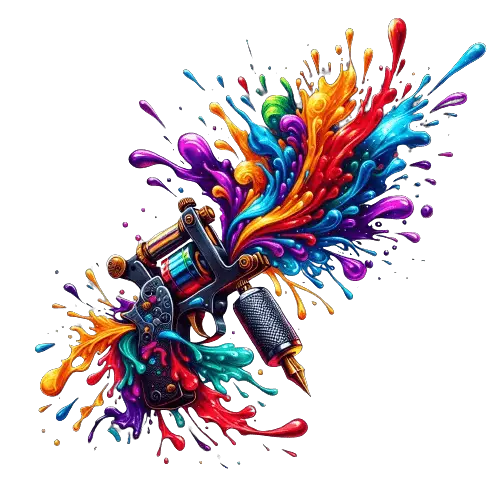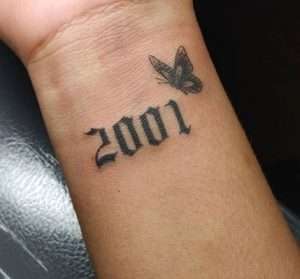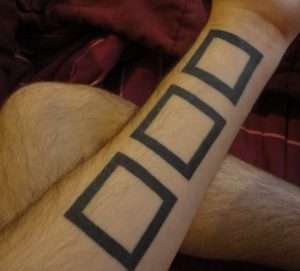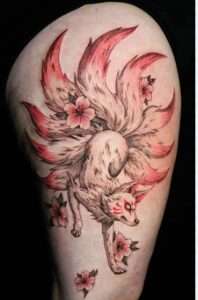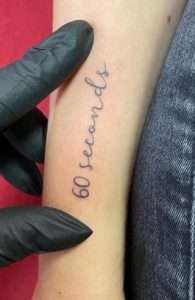Tattoos have multiple meanings that can vary depending on the design and placement on the body.
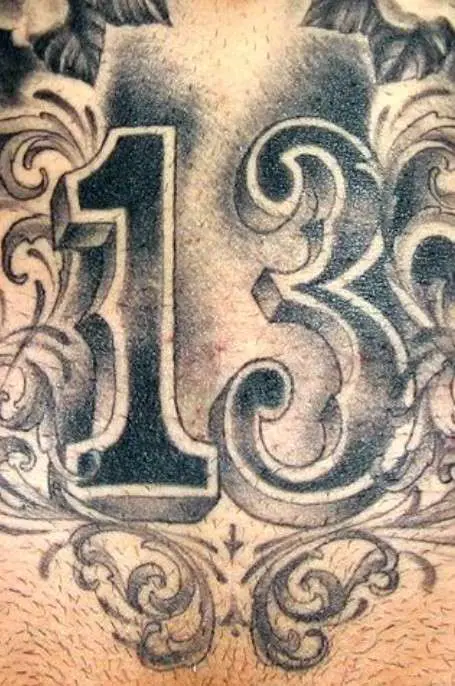
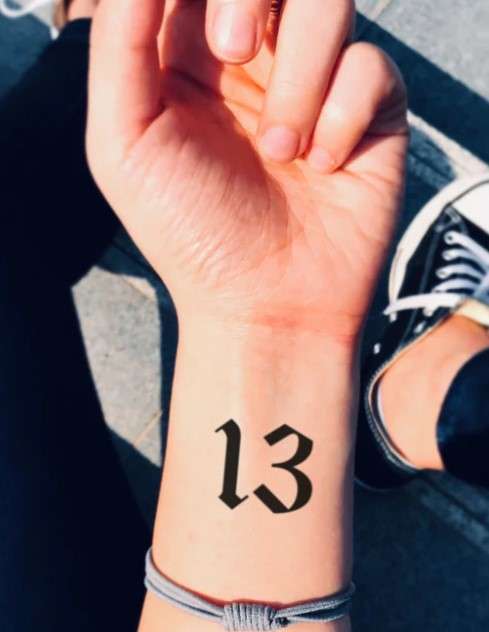
The Fascination Of The Number 13
In the world of tattoos, the number 13 holds a fascinating allure. Across various cultures, this number has deep-rooted significance and is often associated with superstitions. Let’s dive into the mystical realm of the number 13 and explore its significance in tattoo art.
Exploring The Significance Of The Number 13 Across Various Cultures:
- In ancient egypt, the number 13 was considered sacred, representing eternal life and the afterlife.
- Norse mythology associates the number 13 with the god odin, who had twelve sons plus himself, totaling thirteen beings.
- In hinduism, there are thirteen deities in the sun god’s entourage.
- The maya civilization worshipped the number 13, believing it to be connected to the cycles of life and death.
- The jewish tradition considers the number 13 as an age of maturity and adulthood.
Superstitions Surrounding The Number 13:
- The fear of the number 13 is known as triskaidekaphobia, and it’s believed to bring bad luck in many western cultures.
- Friday the 13th has an especially notorious reputation, associated with accidents, misfortune, and supernatural occurrences.
- Many hotels and buildings skip the 13th floor, and some airlines even omit row 13 due to the superstitions surrounding this number.
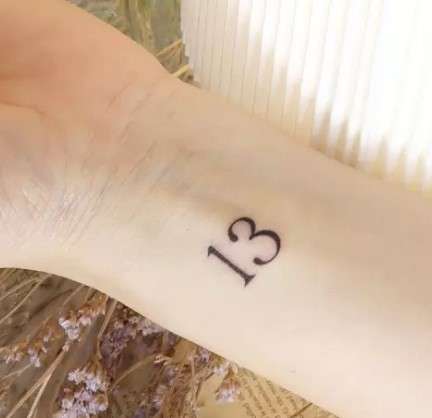
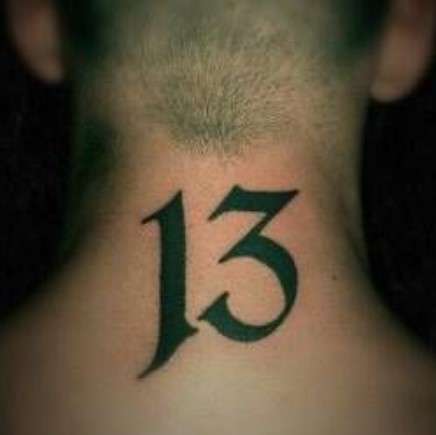
How The Number 13 Translates Into The World Of Tattoos:
- Tattoo enthusiasts often embrace the mystery and intrigue of the number 13 by incorporating it into their designs.
- Some tattoo artists create unique and intricate designs using the number 13 as a focal point, symbolizing luck, spirituality, or personal beliefs.
- The number 13 can also be combined with other tattoo motifs, such as animals, flowers, or symbols, to enhance its meaning and create a striking visual impact.
- Some individuals may choose to get a tattoo of the number 13 to honor their own personal experiences or commemorate significant events in their lives.
- Whether it’s a small discreet tattoo or a bold statement piece, the number 13 holds a special place in the world of tattoos, captivating both tattoo wearers and admirers alike.
The allure of the number 13 in tattoo art is undeniable. Its rich cultural significance and superstitions have given rise to captivating designs that span various styles and interpretations. The mystique and individual meaning attached to the number 13 make it a captivating choice for those seeking to express themselves through the art of tattoos.
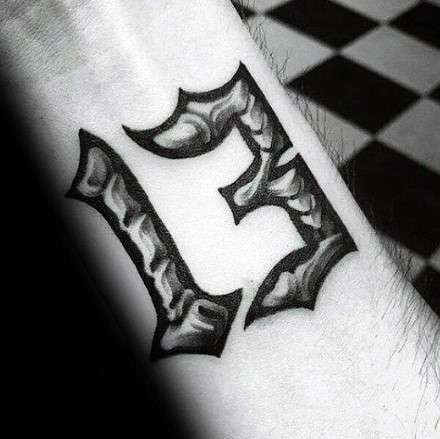
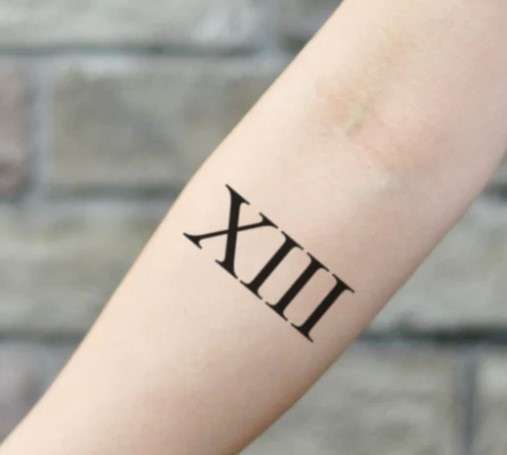
Cultural Symbolism Of Tattoos
Ancient civilizations and their use of tattoos as symbols:
Tattoos have been used as symbols for thousands of years, dating back to ancient civilizations. Across various cultures, tattoos served a multitude of purposes and held significant meaning. Understanding the cultural symbolism behind tattoos provides valuable insight into their historical significance and modern-day interpretations.
- Ancient egyptians: In ancient egypt, tattoos were often seen as marks of beauty and distinction. They were primarily used to symbolize status and religious devotion. Pharaohs and high-ranking priests would adorn themselves with elaborate tattoos that represented their authority and power.
- Ancient greeks and romans: Tattoos were less common in ancient greece and rome, but they were still present among certain groups. The greeks used tattoos to identify slaves or prisoners, while some roman soldiers were marked with tattoos to symbolize their loyalty to the empire.
- Ancient polynesians: Polynesian cultures, such as the maori, have a long-standing tradition of tattooing. Tattoos were considered a form of spiritual expression and storytelling. Each symbol and pattern depicted on the body conveyed specific meanings and represented important aspects of one’s identity and heritage.
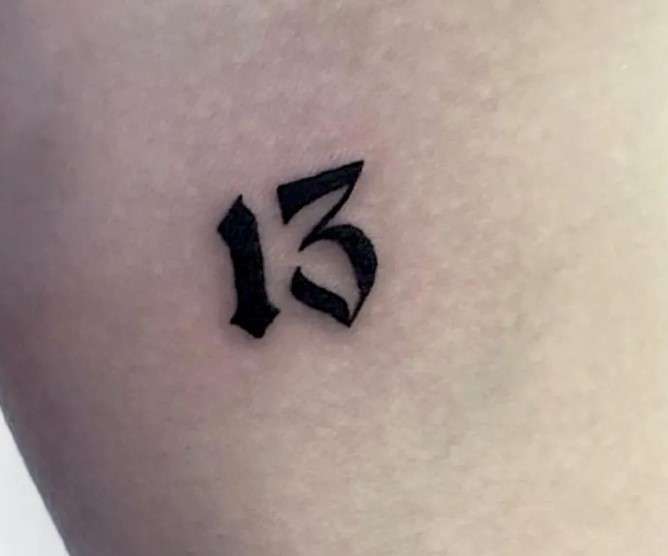
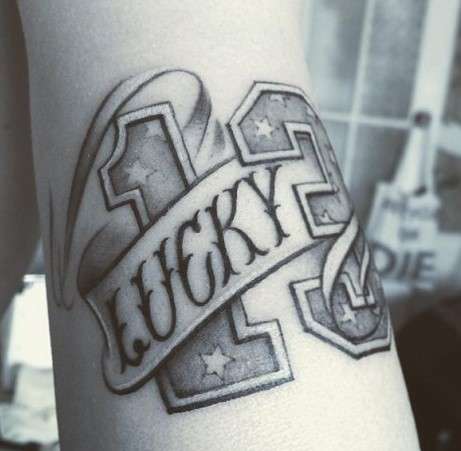
Tattoo traditions in different cultures:
Tattoos have unique cultural significance across the world. From the ancestral practices of the maori to the intricate art of japanese tattooing, each culture has its own distinct tattoo traditions.
- Maori culture: The maori people of new zealand have a rich tattooing tradition known as “moko.” These intricate facial tattoos imparted not only individual identity, but they also showcased tribal affiliations, family lineage, and social status.
- Native american culture: Various native american tribes had diverse tattooing practices. Tattoos were used to signify achievements, tell stories, and mark important stages of life. They often represented spiritual beliefs, protection, and tribal affiliations.
- Japanese culture: Japanese tattoos, or “irezumi,” are famous for their intricate designs and symbolism. They often depict mythological creatures, folklore, or historical events. Tattoos played a significant role in japanese society, representing social status, bravery, and loyalty.
The representation of individual and collective identity through tattoos:
Tattoos serve as powerful tools for expressing both personal and communal identities. They provide individuals with a means of self-expression and a connection to their cultural and social heritage.
- Individual identity: Tattoos can be deeply personal and reflect an individual’s passions, beliefs, and experiences. They allow people to showcase their unique personalities and values, acting as a form of self-expression and empowerment.
- Collective identity: Tattoos can also foster a sense of belonging and community. By embracing cultural symbols, individuals can display solidarity with their social or cultural groups, affirming their shared values and heritage.
Tattoos have a rich history of cultural symbolism spanning ancient civilizations and diverse cultures. They hold meaning beyond mere aesthetics, carrying deep-rooted significance for individuals and communities alike. Understanding the cultural background behind tattoos provides invaluable insight into their significance and helps us appreciate their enduring popularity in modern society.
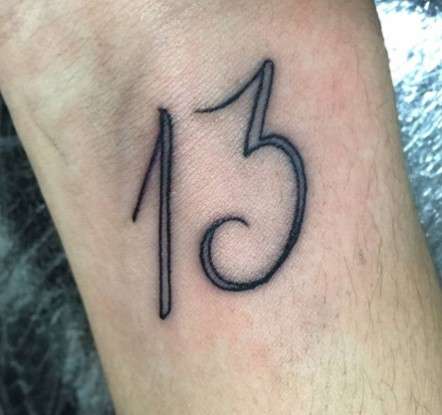
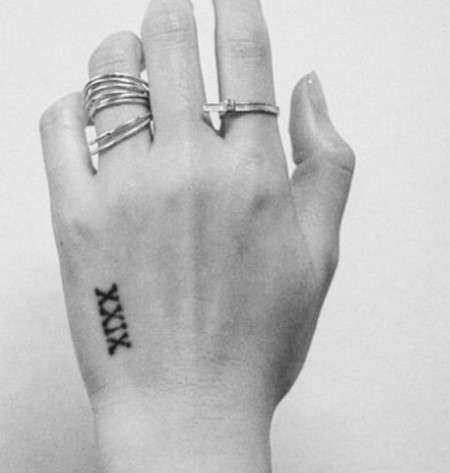
Unveiling The Hidden Meanings Of Infamous 13 Tattoos
The mysterious allure of tattoos has captivated human beings for centuries. Among the myriad of tattoo designs, the number 13 holds a special significance. In this section of the blog post, we will delve into the hidden meanings behind the infamous 13 tattoos.
From the connection to friday the 13th and its tattoo tradition, to the symbolism in witchcraft and the 13th card in the tarot deck, we will unravel the intriguing stories that lie beneath the surface of these tattoos.
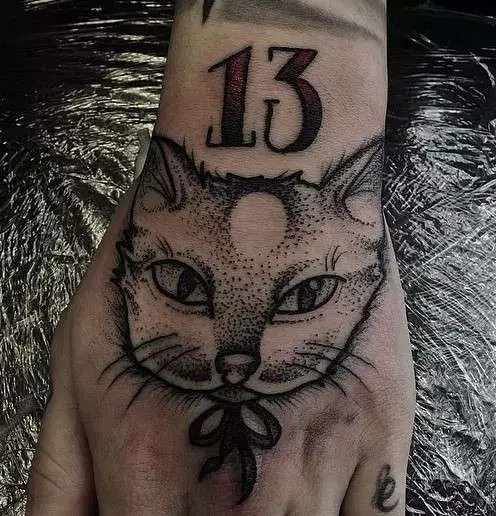
Examining The Various Meanings Associated With 13 Tattoos:
- Superstition: Many view the number 13 as unlucky, leading to tattoos representing defiance against this belief.
- Rebirth and transformation: For some, the number 13 symbolizes change and personal growth, serving as a reminder of the potential for transformation in life.
- Rebellion: 13 tattoos can also signify a rebellious spirit, as those who choose to bear this number often embrace their individuality and nonconformity.
The Connection To Friday The 13Th And Its Tattoo Tradition:
- Historical significance: Friday the 13th has long been regarded as a day of bad luck. Tattoo parlors often hold special flash events on this day, where customers can choose from a selection of pre-designed 13-inspired tattoos at a discounted price.
- Commemoration: Getting a 13 tattoo on friday the 13th has become a tradition for some, serving as a reminder of the shared experience and camaraderie among tattoo enthusiasts.
Thirteen And Witchcraft: The Role Of Witches In Tattoo Symbolism:
- Ancient beliefs: In some folklore and traditions, witches were said to gather in covens of 13 members. 13 tattoos can honor this connection and embrace the mystical qualities associated with witches.
- Protection: It is believed that 13 tattoos can provide a sense of protection, warding off negative energies and enhancing intuition.
The 13Th Card In The Tarot Deck: Death And Its Association With Transformation:
- Symbolism: The 13th card in the tarot deck, death, often represents change, transformation, and rebirth rather than physical death. Those who choose 13 tattoos may resonate with this card’s symbolism of letting go and embracing new beginnings.
- Personal growth: Just as the death card signifies the end of one chapter and the beginning of another, 13 tattoos can symbolize personal growth, encouraging individuals to embrace life’s inevitable changes.
Each 13 tattoo carries its own personal meaning, unique to the individual wearing it. Whether chosen to challenge superstitions, honor traditions, or embrace personal transformation, these tattoos serve as powerful reminders of the complexities of human existence and the ever-present potential for growth and change.
Personal Significance: Unlocking Individual Interpretations
Exploring The Personal Interpretations Behind Getting A 13 Tattoo
For many individuals, tattoos hold a personal significance that goes beyond mere aesthetic appeal. Tattoos can serve as symbols of one’s beliefs, values, and experiences, becoming a form of self-expression that is unique to each individual. When it comes to the number 13, it holds a special meaning that has been deeply ingrained in our society and cultural beliefs.
In this section, we will delve into the personal interpretations behind getting a 13 tattoo, exploring the stories and experiences of individuals who have chosen to ink this number onto their skin.
Stories And Experiences Of Individuals With 13 Tattoos
Each person with a 13 tattoo has a unique story to tell, a personal reason for embracing this number in such a permanent way. Here are some of the key points to consider when understanding the significance of 13 tattoos:
- Superstitions and beliefs: The number 13 has long been associated with superstitions, from being considered unlucky to having spiritual or mystical connotations. Some individuals may get a 13 tattoo to challenge these superstitions or to embrace the mysterious energy associated with this number.
- Personal symbolism: Beyond its cultural associations, the number 13 can also hold personal significance for individuals. It may represent a birthday, an important life event, or a lucky number in their life. The tattoo becomes a symbol of personal growth, resilience, or even a reminder of someone or something cherished.
- Thematic connections: Some people may choose to get a 13 tattoo as part of a broader theme or design. This could include incorporating the number into a larger tattoo representing elements such as astrology, spirituality, or their favorite band. The tattoo serves to enhance the overall meaning and visual impact of the design.
- Breaking societal norms: Getting a 13 tattoo can be seen as a form of rebellion against societal norms and expectations. It can signify a person’s refusal to conform to what is considered “normal” or to be swayed by common fears or beliefs. It’s a way of embracing individuality and challenging the status quo.
How Personal Beliefs And Experiences Shape The Meaning Of Tattoos
Tattoos, including 13 tattoos, are deeply personal expressions of self. It is the culmination of an individual’s beliefs, experiences, and aspirations. Here are some key points to consider when understanding how personal beliefs and experiences shape the meaning of tattoos:
- Cultural and religious influences: Personal beliefs, cultural backgrounds, and religious practices play a significant role in shaping the meaning behind a tattoo. For example, in some cultures, the number 13 may hold particular religious or spiritual significance, which could influence an individual’s decision to get a tattoo of this number.
- Life experiences and milestones: Tattoos can also represent significant milestones or life events. The number 13 may hold meaning for someone who has faced challenges and emerged stronger, or it could represent a turning point in their life journey. Such personal experiences give tattoos a deeper emotional connection.
- Identity and self-expression: Tattoos are a way for individuals to express their identity, whether it be their personal values, artistic preferences, or philosophical outlook. A 13 tattoo can become a symbol of self-empowerment, embracing uniqueness, or defying societal expectations.
- Evolving meanings: The meanings behind tattoos can change and evolve over time. What may have initially been a simple personal connection to the number 13 can deepen with age, reflecting new experiences and personal growth. The tattoo becomes a permanent reminder of the different chapters in an individual’s life.
Overall, personal significance lies at the heart of 13 tattoos. The stories and experiences of individuals who choose to ink this number onto their bodies bring unique interpretations and meanings to this seemingly ordinary number. It is through exploring these personal narratives that we can begin to unlock the multitude of interpretations behind the 13 tattoo.
Breaking Stereotypes: The Positive Symbolism Behind 13 Tattoos
Tattoos have always held a certain fascination, with their intricate designs and hidden meanings. However, one tattoo symbol that often gets a bad rap is the number 13. Commonly associated with bad luck and superstition, the number 13 has been misunderstood for far too long.
In reality, 13 tattoos can represent a wealth of positivity, breaking stereotypes and challenging preconceived notions. So, let’s dive into the world of 13 tattoos and explore the positive symbolism that lies beneath.
Highlighting Positive Interpretations Of 13 Tattoos:
- Transformation: The number 13 is often associated with transformation, symbolizing growth, rebirth, and the ability to overcome challenges in life.
- Resilience: Choosing a 13 tattoo can showcase one’s resilience and ability to rise above adversity. It is a powerful reminder that setbacks do not define us but rather inspire us to persevere.
- Inner strength: 13 tattoos can serve as a symbol of inner strength and personal power. They remind us to tap into our own resilience and rely on our inner resources to overcome obstacles.
- Journey: Just as there are 13 phases of the moon, a 13 tattoo can represent a journey, with each phase signifying a significant step or milestone achieved along the way.
- Individuality: Embracing a 13 tattoo is a celebration of individuality, reminding us that it’s okay to be unique and stand out from the crowd. It encourages self-expression and authenticity.
Overcoming Negative Perceptions And Challenging Stereotypes:
- Shifting narratives: Choosing a 13 tattoo enables individuals to challenge society’s negative perceptions and redefine the meaning behind it. By embracing positivity and personal growth, we can rewrite the narrative associated with this number.
- Educating others: By proudly displaying a 13 tattoo, individuals can spark conversations and educate others about the positive symbolism behind it. This helps break down stereotypes and encourages a more open-minded outlook.
- Changing perspectives: When people witness the positive energy radiating from those with 13 tattoos, it challenges their own preconceived notions. This gradual change in perspective gives others the opportunity to see beyond superstition and appreciate the beauty within this symbol.
Promoting Inclusivity And Celebrating Uniqueness Through 13 Tattoos:
- Inclusive symbol: 13 tattoos can foster a sense of inclusivity within a community or group. They become a unifying symbol, allowing individuals with diverse backgrounds and experiences to connect and celebrate their shared positive interpretations.
- Empowerment: Choosing a 13 tattoo can empower individuals to embrace their unique qualities and break free from societal norms. It becomes a statement of empowerment, encouraging others to embrace their own individuality.
- Spreading positivity: Each person who proudly displays a 13 tattoo becomes a beacon of positivity, spreading awareness and challenging the negative associations. By embracing this symbol, we can create a ripple effect of acceptance, celebration, and diversity.
13 tattoos have the power to break down stereotypes, challenge negative perceptions, and promote inclusivity. By embracing their positive symbolism, individuals can showcase their resilience, inner strength, and individuality. Let’s celebrate the uniqueness that lies within us all and rewrite the narrative surrounding 13 tattoos.
Tattooing As An Artistic Expression
Tattoos have long been recognized as a form of artistic expression, allowing individuals to showcase their creativity and personal narratives on their bodies. The art of tattooing goes beyond just ink and skin – it is a profound way for people to connect with themselves, their cultures, and the world around them.
In this section, we will explore the role of the tattoo artist as a creative interpreter and storyteller, how symbolism and aesthetic appeal are incorporated into tattoo designs, and the deep connection between tattoo art, culture, and personal expression.
The Tattoo Artist As A Creative Interpreter And Storyteller
- Tattoo artists are more than just skilled technicians with a needle; they are true artists who bring their clients’ ideas and visions to life.
- They possess the ability to understand their clients’ desires and transform them into a visual representation on the skin, ensuring that the tattoo tells a unique and captivating story.
- Through their craft, tattoo artists have the power to capture emotions, memories, and personal experiences, turning them into meaningful and permanent works of art.
Incorporating Symbolism And Aesthetic Appeal Into Tattoo Designs
- Symbolism plays a significant role in tattoo art, with each design carrying its own unique meaning.
- Tattoo artists skillfully incorporate symbols, whether it’s a favorite flower, an animal, or a spiritual emblem, to imbue the tattoo with deep significance and personal significance.
- Aesthetic appeal is also of utmost importance in tattooing, as artists carefully consider the placement, size, and colors to create visually striking and harmonious designs.
- From bold and vibrant to delicate and intricate, each tattoo composition is a testament to the artistic prowess of the tattooist.
The Connection Between Tattoo Art, Culture, And Personal Expression
- Tattoos have a rich history rooted in various cultures, representing different beliefs, traditions, and identities.
- They serve as a powerful means of cultural expression, allowing individuals to proudly display their heritage and connection to their communities.
- Personal expression is at the core of tattooing. People use tattoos to tell their own stories, to commemorate loved ones, or to express their passions and individuality.
- By choosing specific designs, styles, and techniques, individuals leave a permanent mark on their bodies that reflects their unique journeys and experiences.
Tattooing is undeniably a form of artistry that has stood the test of time. Tattoo artists are not only skilled technicians, but also creative interpreters and storytellers. They bring meaning and symbolism to life through their designs, incorporating aesthetic appeal to create true works of art.
Tattoo art, deeply rooted in culture, serves as a canvas for personal expression, allowing individuals to proudly display their unique stories and identities. So, the next time you admire a tattoo, remember that it is more than just ink on skin; it is a profound reflection of the human desire to create, connect, and leave a lasting mark.
Psychological Power: The Role Of Tattoos In Self-Empowerment
Tattoos have long been associated with self-expression, but their power goes beyond mere aesthetics. In fact, tattoos can serve as potent reminders, affirmations, and motivations in our lives, effectively empowering us to be the best versions of ourselves. The transformative nature of tattoos transcends the physical realm, delving deep into the realm of psychology.
By studying the psychological impact of tattoos on individuals, we gain insights into the complexities of self-empowerment. Let us explore the various ways in which tattoos can play a role in our journey towards personal growth and empowerment.
The Transformative Power Of Tattoos In Self-Expression And Empowerment:
- Tattoos allow individuals to express their true selves, serving as a visual representation of their beliefs, passions, and experiences.
- They provide a sense of empowerment by enabling individuals to take ownership of their bodies and define their identity on their own terms.
- Tattoos act as a form of self-validation, reminding individuals of their inner strength and resilience.
How Tattoos Can Serve As Reminders, Affirmations, Or Motivation:
- Tattoos can serve as powerful reminders of past experiences, helping individuals learn from their mistakes and grow from their triumphs.
- They can act as affirmations, reinforcing positive beliefs and encouraging individuals to embrace their unique qualities.
- Tattoos can also serve as a source of motivation, reminding individuals of their goals and aspirations, and driving them towards success.
Studying The Psychological Impact Of Tattoos On Individuals:
- Research suggests that tattoos can enhance self-esteem and self-confidence, empowering individuals to embrace their true selves.
- Tattoos may also facilitate a sense of belonging and community, creating connections with others who share similar interests and experiences.
- Understanding the psychological impact of tattoos can help professionals in various fields, such as psychology and counseling, to provide effective support to individuals with tattoos.
As we delve deeper into the realm of tattoos, we uncover the immense psychological power they hold in self-empowerment. From providing a means of self-expression to serving as reminders, affirmations, or motivation, tattoos play a significant role in shaping our identity and empowering us to become the best version of ourselves.
By studying their psychological impact, we gain valuable insights into the transformative power of tattoos and their profound influence on our journey towards self-empowerment.
Modern Trends And Innovations In 13 Tattoos
Did you know that 13 tattoos have become increasingly popular in modern times? These unique inkings hold significant meanings and have evolved with contemporary trends and innovations. In this blog post, we will explore the fascinating world of 13 tattoos, focusing on modern interpretations, innovative designs, and influential artists who have contributed to the symbolism behind this intriguing number.
Contemporary Reinterpretations Of 13 Tattoos
- Incorporating elements of minimalism and abstract art, contemporary artists have reimagined the traditional symbolism of 13 tattoos.
- Modern interpretations often emphasize personal significance and individual storytelling, allowing individuals to express their identity and beliefs through these designs.
- Tattoo enthusiasts now have the freedom to choose from a wide range of style options, including fine line work, watercolor techniques, dotwork, and geometric patterns.
- Innovative artists are pushing the boundaries of creativity by exploring unconventional placements for 13 tattoos, such as behind the ear, on the fingers, or even integrated into larger tattoo compositions.
Innovative Designs And Styles That Incorporate The Number 13
- The number 13 itself is cleverly integrated into tattoo designs, often acting as a central focal point or a hidden detail within a larger artwork.
- Symbolic imagery, such as black cats, ravens, skulls, or playing cards, are commonly combined with the number 13 to create visually striking and meaningful tattoos.
- Modern tattoo artists are also experimenting with new techniques like negative space, where the number 13 is cleverly formed using areas left untattooed, creating a unique and eye-catching effect.
- Styles like neo-traditional, realism, and illustrative have been infused with the number 13, resulting in bold and visually dynamic tattoos that still embody the traditional tattoo aesthetic.
Influential Artists And Their Contributions To 13 Tattoo Symbolism
- Esteemed tattoo artists have played a pivotal role in expanding the symbolism associated with 13 tattoos, infusing their individual artistic styles and perspectives.
- Artists like ami james, kat von d, and paul booth have established themselves as pioneers in the world of 13 tattoos, contributing to its growing popularity and cultural significance.
- These influential artists have employed a deep understanding of symbolism and their unique artistic visions to create 13 tattoo designs that capture the essence of their clients’ stories and aspirations.
- Through their impressive body of work, they have elevated 13 tattoos to new heights, encouraging enthusiasts to embrace this captivating number and its meaningful associations.
As the world of tattooing continues to evolve, 13 tattoos remain an enduring and intriguing choice for those seeking to express themselves through body art. By exploring contemporary reinterpretations, innovative designs, and influential artists, we can gain a deeper understanding of the rich symbolism and cultural significance behind this mysterious number.
So, whether you are contemplating your first tattoo or looking to add another meaningful piece to your collection, consider the modern trends and innovations in 13 tattoos for a truly unique and captivating design.
Frequently Asked Questions On 13 Tattoo Meaning
How Can I Choose The Right Tattoo Design?
Choosing the right tattoo design involves considering personal preferences, symbolism, and consulting with a skilled tattoo artist.
What Are Some Popular Tattoo Designs?
Popular tattoo designs vary, but some common choices include symbols, animals, quotes, and nature-inspired imagery.
Does The Placement Of A Tattoo Have Significance?
Yes, the placement of a tattoo can hold significance. Some people choose specific body areas based on cultural symbolism or personal meaning.
Conclusion
To summarize, tattoos hold deep symbolic meanings that are personal and significant to the individual getting inked. From representing personal journeys and achievements to honoring loved ones and displaying inner strength, there are various tattoo meanings that people choose to express themselves.
Tattoo designs such as anchors, birds, and butterflies hold specific connotations that resonate differently with each person. Additionally, cultural and religious symbols like the om, cross, or hamsa hold profound spiritual significance. It is important to remember that tattoo meanings can vary based on cultural context and personal interpretation.
Whatever the reason for getting a tattoo may be, it is crucial to take the time to understand the symbolism behind the design and ensure it aligns with one’s values. With careful thought and consideration, tattoos can offer a beautiful form of self-expression and carry a powerful message for a lifetime.
